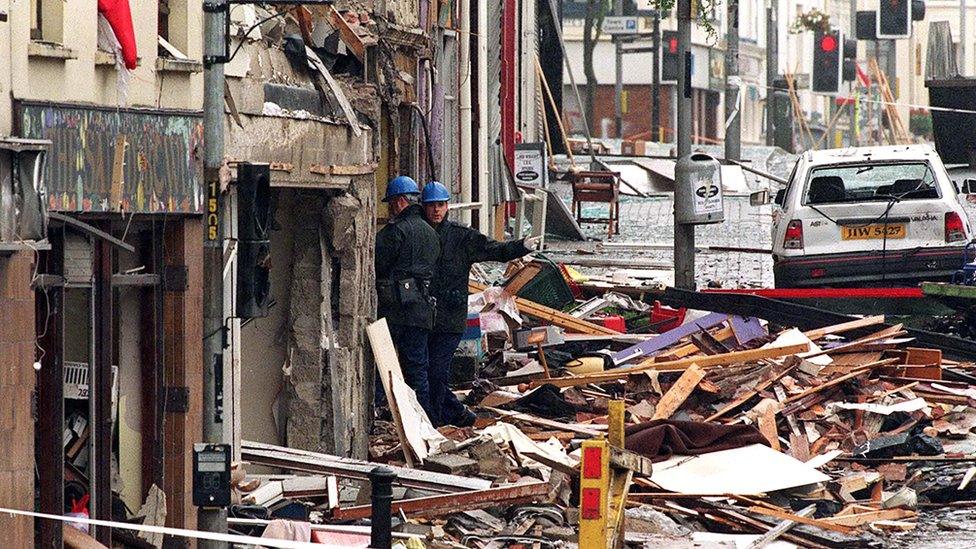Omagh bomb service hears victims 'still suffering'
- Published
Twenty-nine people - including a woman pregnant with twins - died in the 1998 attack in the County Tyrone town.
Victims who "suffered and those who are still suffering" have been remembered at a cross-community ceremony ahead of the 20th anniversary of the Omagh bomb.
The memorial included prayers in both English and Irish as well as a reading in Spanish, the native tongue of two of the victims.
The event also paid tribute to "all victims of terrorism" around the world.
The Omagh bombing inflicted the greatest single loss of life of any terror atrocity in the history of the Northern Ireland Troubles.
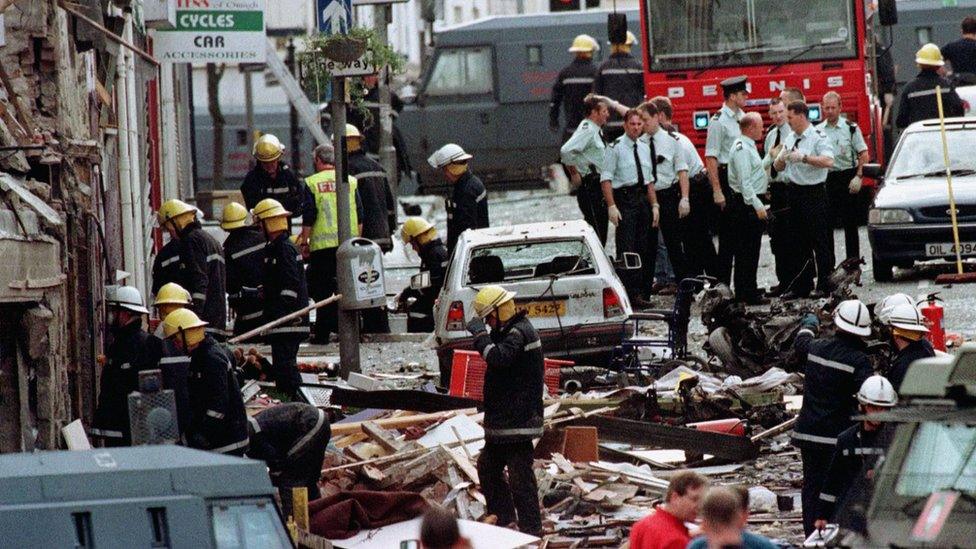
Twenty-nine people, including a woman pregnant with twins, were killed in the 1998 attack
The car bomb attack was carried out by the dissident republican group the Real IRA, several months after the signing of the Good Friday Agreement.
Sunday's ceremony took place in the town's Memorial Garden, where wreaths were laid and the names of all those killed in the attack were read out, one by one.
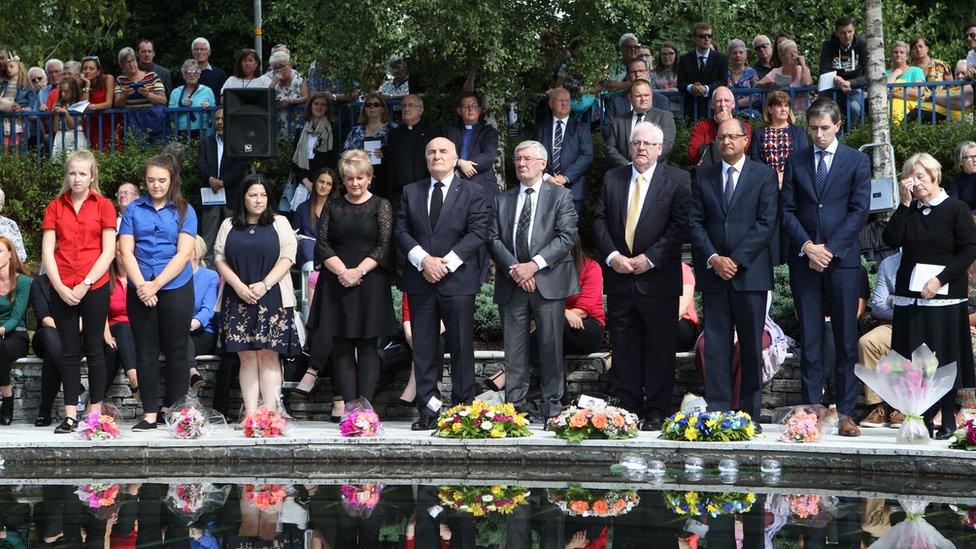
The memorial service took place in Omagh on Sunday afternoon
Representatives of the British, Irish and Spanish governments attended, reflecting the nationalities of the victims.
As well as prayers, speeches and music, a minute's silence was held in remembrance of those who died.
'Courageous work'
The ecumenical service included contributions from the Church of Ireland, Presbyterian, Methodist and Catholic Churches.
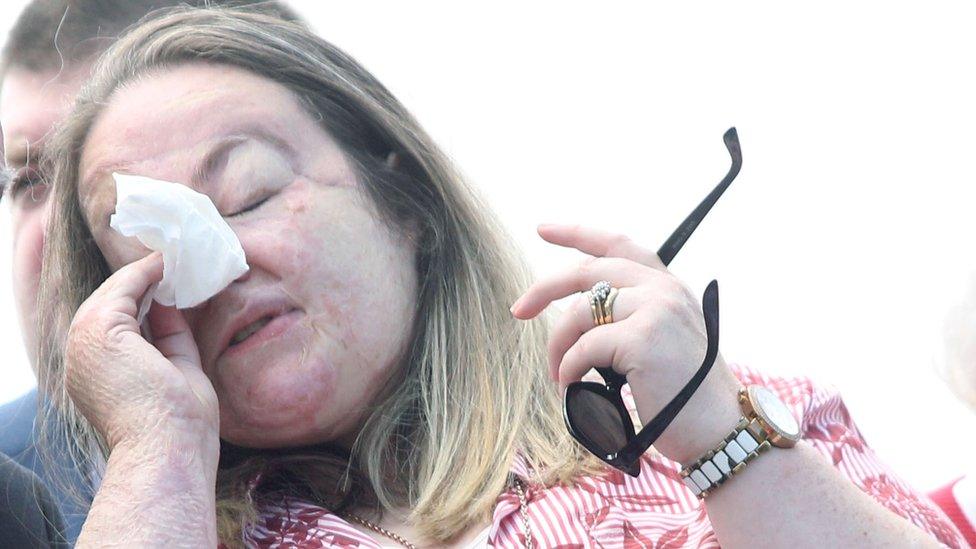
Donna-Marie McGillion, who suffered burns to 65% of her body in the bombing, at the memorial service
It also heard from council officials who led local government agencies' response in the aftermath of the bombing.
The organisers paid tribute to "those who have suffered and those who are still suffering, as a result of 15th August 1998 atrocity".
"We thank the first responders, the police services, the intelligent services, the fire departments, the first aiders, the paramedics and the medical professionals for the courageous work that they carry out," they said.
The interdenominational service featured the Omagh Community Youth Choir and includes a song specially composed by its musical director, Daryl Simpson.
Omagh bomb: Community Youth Choir 20 years on
Michael Gallagher is chairman of the Omagh Support and Self Help Group that organised the service.
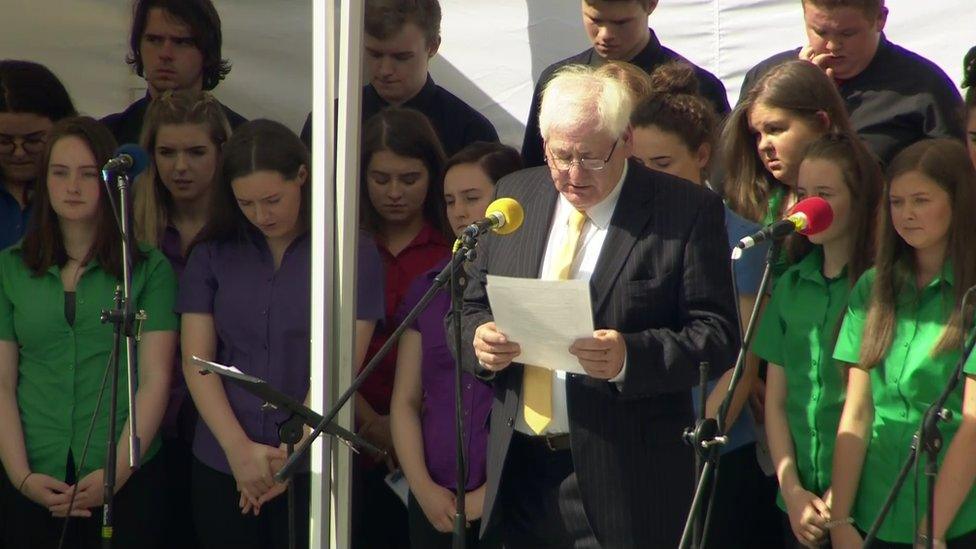
Michael Gallagher, whose son was killed in the bombing, speaking at the memorial service
His 21-year-old son, Aiden, was among those killed in the blast.
Mr Gallagher said that communal inter-worship had been well supported over the past two decades and added it "makes a powerful statement about the community in Omagh".
"As a small province, we are facing our greatest challenges ahead. We would appeal to the political parties to seek agreement so that we can move forward," he said.
"Working alone we can achieve very little but in collaborative ventures we can achieve a great deal.
"We as a community have paid the highest price. Let us not forget why we need to make this work, showing strength, courage and leadership," added Mr Gallagher.
Kat Wilkinson, whose brother was killed, said that the time was "right" to discontinue the public events to mark the anniversary and "let families be on their own for that day, go to the grave and do their own grieving on the next anniversaries".
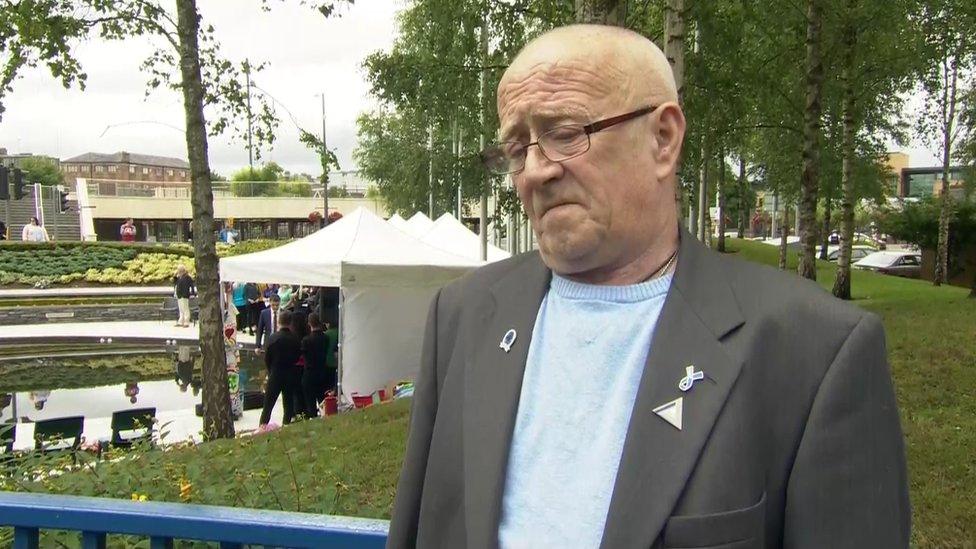
Kevin Skelton, who lost his wife in the bomb, said there is no strategy to "look after people left behind"
Stanley McComb, whose wife died in the bomb, said: "It doesn't seem like 20 years, but those 20 years certainly have taken its toll on everyone."
Kevin Skelton, who also lost his wife, expressed his anger that there "is no strategy to deal with the victims."
"The past is the past...it is time we deal with the present and look after people left behind," he said.

Omagh bomb timeline
15 August 1998 - A large car bomb explodes on a Saturday afternoon in the centre of Omagh,, external County Tyrone, fatally wounding 29 people.
18 August 1998 - The Real IRA claims responsibility for the bomb, external.
6 August 2003 - Alleged founder and leader of the Real IRA Michael McKevitt is found guilty of directing terrorism, external.

The bomb, which was packed with 225kg of explosives, detonated in a vehicle parked in the middle of the main street just after 15:10 BST on 15 August 1998.
A warning had been called in 40 minutes earlier but had given the wrong location of the car containing the bomb.
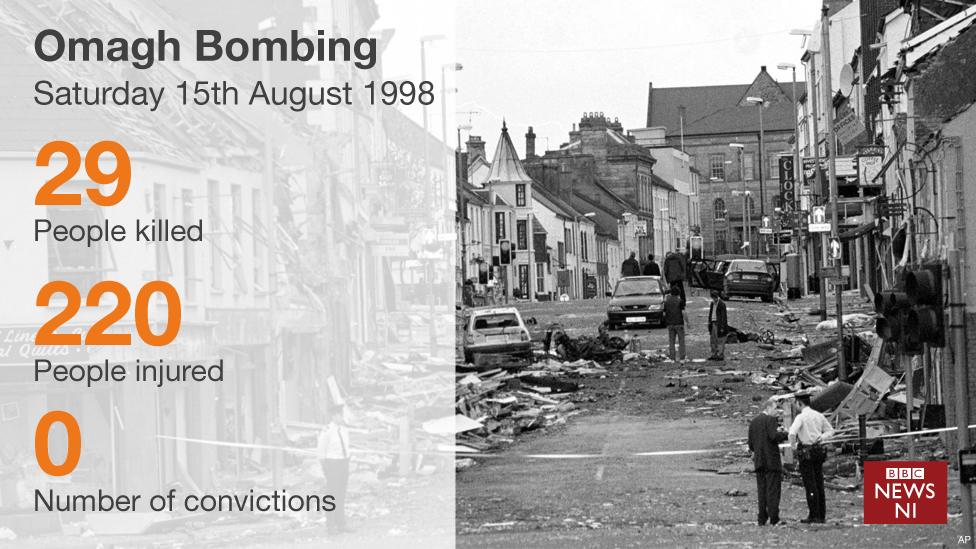
The dead included three generations of one family.
No-one has been convicted over the bombing.
Last year, relatives of the victims announced they would sue the PSNI's chief constable George Hamilton for failings they believed allowed the killers to escape justice.
Mr Hamilton said he understands why the families "would feel angry and let down".
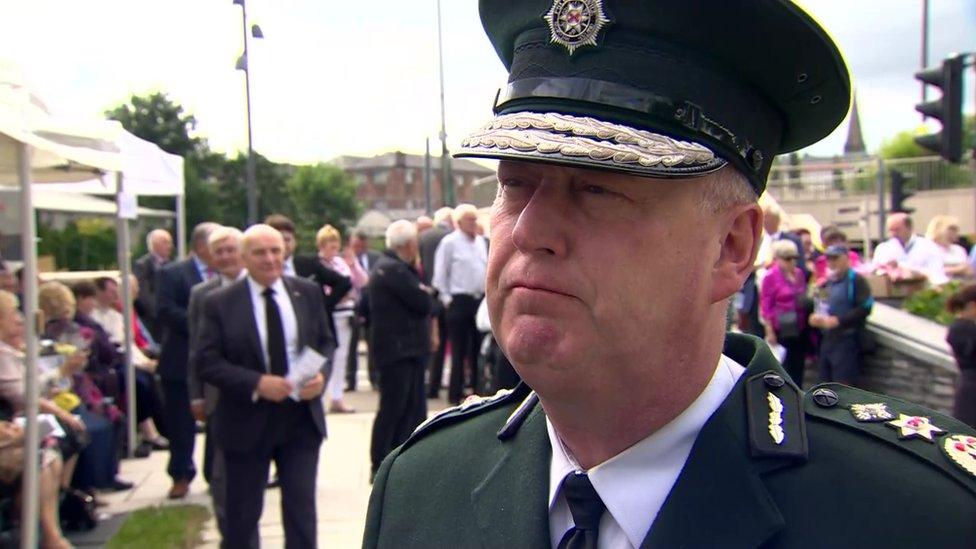
PSNI Chief Constable George Hamilton
"There has been a huge amount of investigative effort has gone into Omagh. There have been 99 arrests and between ourselves and An Garda Síochána (Irish police), over 11,000 investigative actions pursued, but it is not good enough.
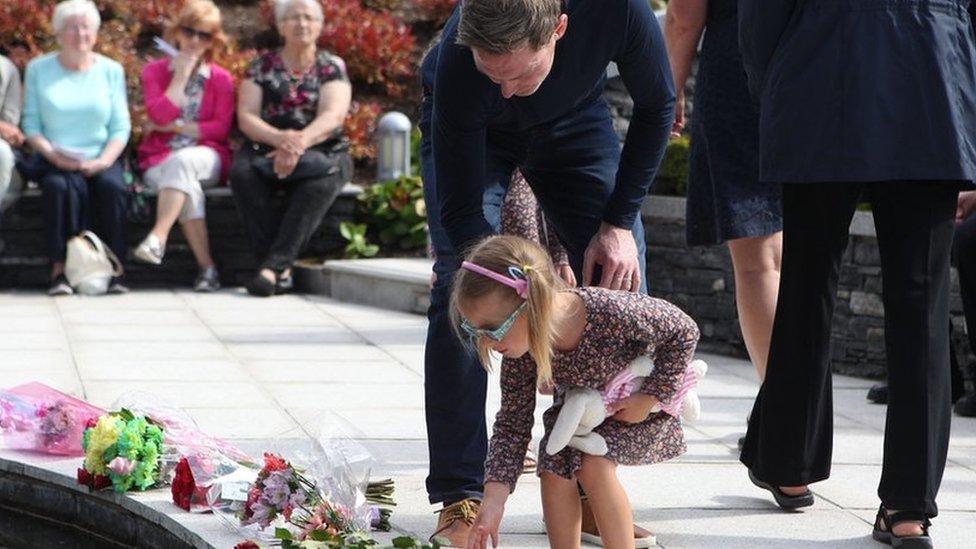
A child leaves a tribute at the memorial
"People have not been brought to justice.... but the families have an assurance from me that if new evidence emerges, we will actively pursue that. But it is also fair to say, and realistic, that as time goes by, the chances of a criminal justice outcome reduces," added the chief constable.

From the scene - BBC News NI reporter Julian Fowler:
It is one of those events that people will look back at and remember where they were and what they were doing on 15 August 1998.
The overwhelming sentiment, speaking to people in the town over the last few days, is how hard it is to believe that was 20 years ago.
I'm standing beside the memorial garden and inscribed in stone, along with the names of those killed, is a sense of what happened that day.
It says: "Weather-wise, it was one of the best days that summer had seen.
"Ordinary people were doing ordinary things on an ordinary day and in one fateful moment, all this was changed forever.
"Time stood still, futures were obliterated, lives were shattered and hearts were broken."
Each year, over those last 20 years, people have come together to mark the anniversary, but this year's event in the memorial garden is due to be the last to take place on this scale.

On Wednesday, the day of the 20th anniversary of the bombing, the town will host a public vigil of "remembrance and hope".
- Published3 July 2018

- Published10 August 2017
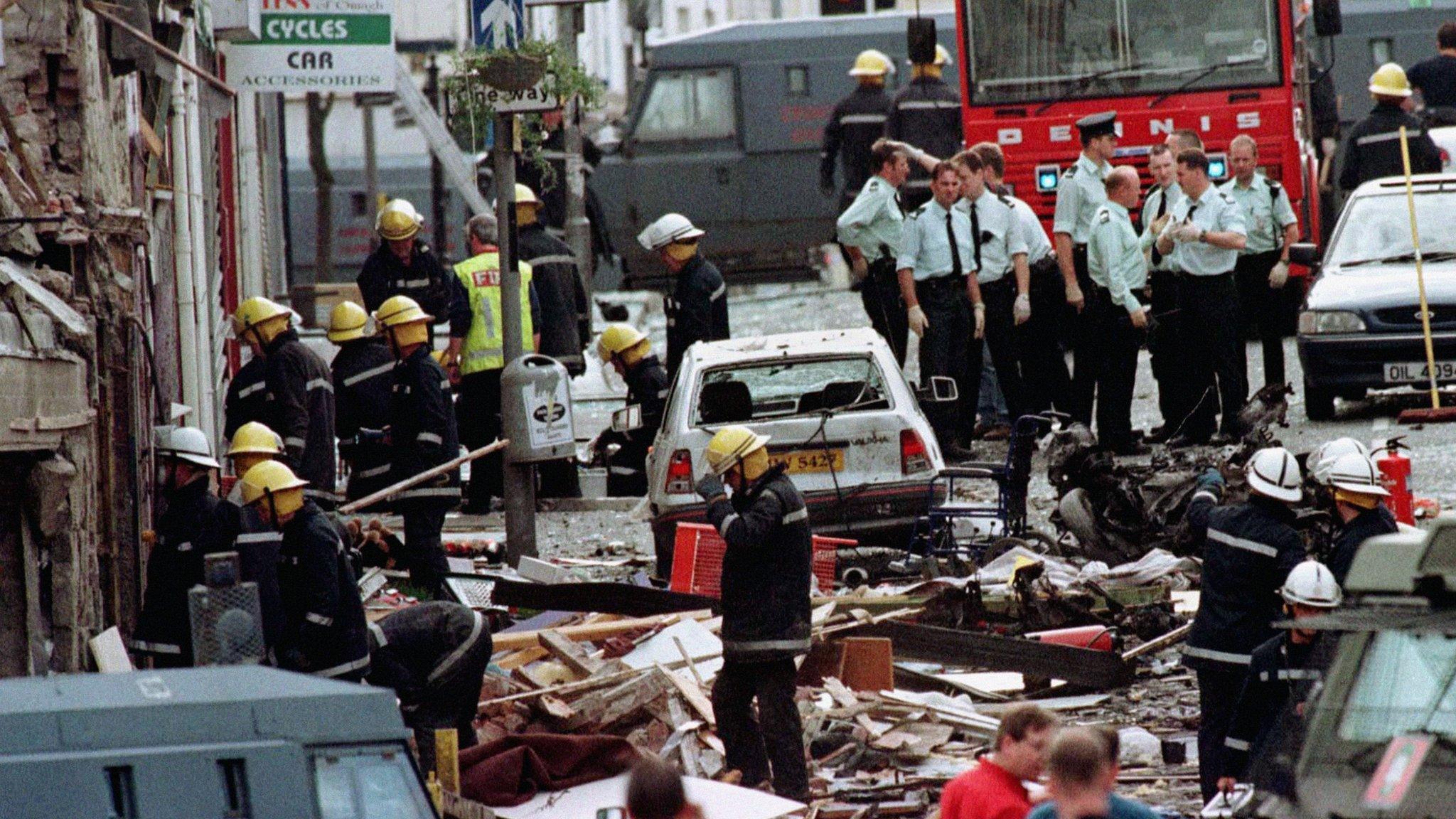
- Published1 March 2016
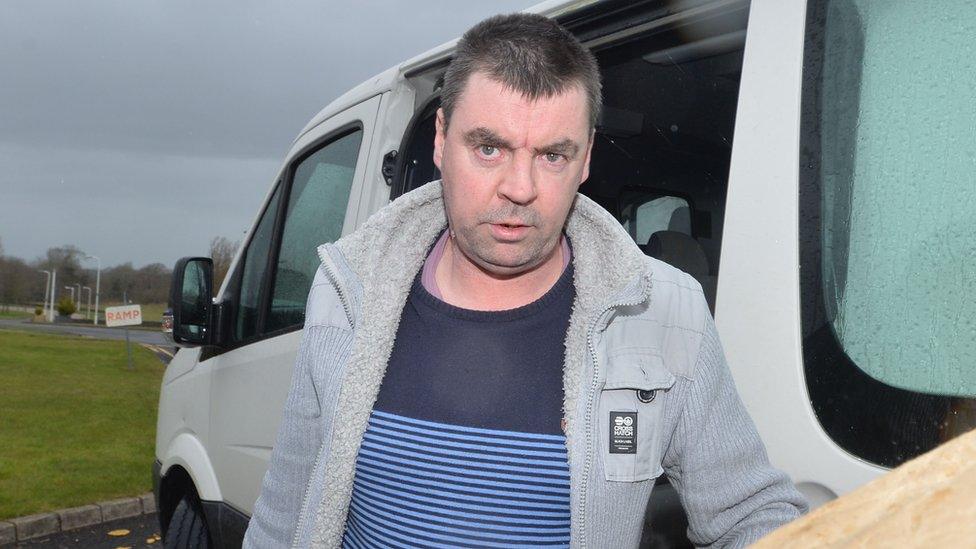
- Published28 January
